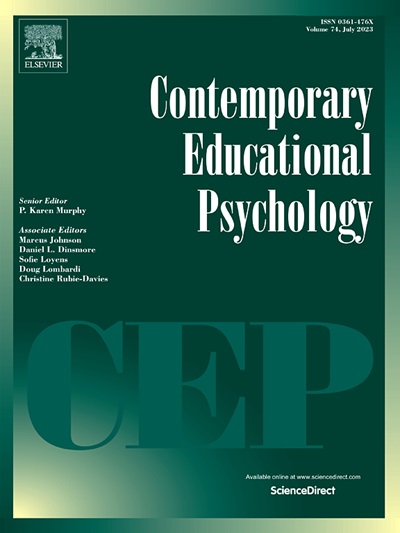初中教育中的不参与和不成功参与反馈:学生特点的作用
IF 3.8
1区 心理学
Q1 PSYCHOLOGY, EDUCATIONAL
引用次数: 0
摘要
反馈可以是一种强大的学习干预,学习者的积极参与被认为是反馈有效性的最重要决定因素之一。但并不是所有的学生都能成功地接受反馈。在本研究中,我们的目的是通过关注学生的文本修改作为反馈反应的指标,使学生对反馈的参与可见。在反馈处理理论模型的基础上,我们区分了行为不参与(即收到反馈后根本不修改)和不成功参与(即收到反馈后修改,但在此过程中没有改进)。利用这一区别,我们将两组学生的特征与那些(成功地)参与反馈的学生的特征进行了比较。我们对937名德国初中学生(女性占49%,7年级[28%],8年级[29%]和9年级[43%])的写作任务提供了基于计算机的自动反馈,要求学生根据反馈修改他们的文本。我们发现,20%的学生在收到反馈后没有对他们的文本进行任何修改(不参与),47%的学生在文本修改期间使用反馈后没有提高他们的表现(不成功的参与)。男学生和认知能力较低的学生更有可能表现出不投入。对于不成功的参与,认知能力和英语成绩是相关的预测因素,这暗示了特定领域的能力在将反馈转化为有效的复习中所起的作用。我们还发现,内在任务价值与成功的反馈参与之间存在显著的正相关。我们讨论了未来的研究如何通过采用更细粒度的方法来调查反馈反应来促进对反馈处理的理解。本文章由计算机程序翻译,如有差异,请以英文原文为准。
Nonengagement and unsuccessful engagement with feedback in lower secondary education: The role of student characteristics
Feedback can be a powerful learning intervention and learners’ active engagement is assumed to be one of the most important determinants of feedback effectiveness. But not all students successfully engage with feedback. In the present study, we aimed to make students’ engagement with feedback visible by focusing on their text revisions as an indicator of feedback response. On the basis of theoretical models of feedback processing, we differentiated between behavioral nonengagement (i.e., not revising at all after receiving feedback) and unsuccessful engagement (i.e., revising after receiving feedback, but not improving in the process). Capitalizing on this distinction, we compared the characteristics of students in both groups with those of students who (successfully) engaged with the feedback. We provided automated computer-based feedback on a writing task to a sample of 937 students in lower secondary education in Germany (49% female, Grades 7[28%], 8 [29%], and 9[43%]), asking students to revise their texts according to the feedback. We found that 20% of the students did not make any revisions to their text after receiving feedback (nonengagement) and that 47% of the students did not improve their performance after working with the feedback during a text revision (unsuccessful engagement). Male students and students with lower cognitive abilities were more likely to show nonengagement. For unsuccessful engagement, cognitive abilities and the English grade were relevant predictors, hinting at the role that domain-specific competencies play in translating feedback into effective revision. We also found significant positive associations of intrinsic task value with successful feedback engagement. We discuss how future research could advance understanding of feedback processing by taking a more fine-grained approach to investigating feedback response.
求助全文
通过发布文献求助,成功后即可免费获取论文全文。
去求助
来源期刊

Contemporary Educational Psychology
PSYCHOLOGY, EDUCATIONAL-
CiteScore
16.50
自引率
3.90%
发文量
74
期刊介绍:
Contemporary Educational Psychology is a scholarly journal that publishes empirical research from various parts of the world. The research aims to substantially advance, extend, or re-envision the ongoing discourse in educational psychology research and practice. To be considered for publication, manuscripts must be well-grounded in a comprehensive theoretical and empirical framework. This framework should raise critical and timely questions that educational psychology currently faces. Additionally, the questions asked should be closely related to the chosen methodological approach, and the authors should provide actionable implications for education research and practice. The journal seeks to publish manuscripts that offer cutting-edge theoretical and methodological perspectives on critical and timely education questions.
The journal is abstracted and indexed in various databases, including Contents Pages in Education, Australian Educational Index, Current Contents, EBSCOhost, Education Index, ERA, PsycINFO, Sociology of Education Abstracts, PubMed/Medline, BIOSIS Previews, and others.
 求助内容:
求助内容: 应助结果提醒方式:
应助结果提醒方式:


